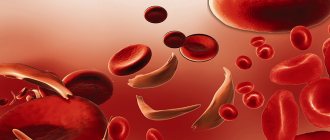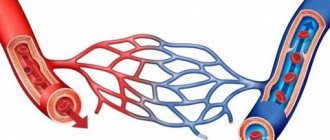Antiphospholipid syndrome - a symptom complex based on the development of an autoimmune reaction and the appearance of antibodies to widespread phospholipid determinants present on the membranes of platelets, endothelial cells, and nervous tissue.
Antiphospholipid syndrome was first described in detail in systemic lupus erythematosus by Hughes.
There are several classes of membrane phospholipids, differing in structure and immunogenicity. The most common “neutral” phospholipids in the body are phosphatidylethanolamine (PE) and phosphatidylcholine (PC). “Negatively charged” (anionic) phospholipids - phosphatidylserine (PS), phosphatidylinositol (PI) and cardiolipin (diphosphatidylglycerol) are localized on the inner surface of biomembranes and exposed during cellular activation.
Antibodies to phospholipids are a heterogeneous population of antibodies that react with negatively charged, and less commonly, neutral phospholipids. Antiphospholipid antibodies include the following types of antibodies:
- lupus anticoagulant - a population of antiphospholipid antibodies of the IgG or IgM class, capable of suppressing phospholipid-dependent coagulation reactions in vitro by interacting with the phospholipid component of the prothrombinase activator complex. Lupus anticoagulant was initially discovered in the blood serum of patients with systemic lupus erythematosus. In systemic lupus erythematosus, the production of lupus anticoagulant is associated, in contrast to the in vitro results, not with bleeding, but with a paradoxical increase in the frequency of thrombosis;
- antibodies to cardiolipin - an immunologically heterogeneous population of antibodies that react with immobilized negatively charged phospholipid - cardiolipin, which is the main antigen of the Wassermann reaction; antibodies to cardiolipin can belong to various isotypes of immunoglobulins IgG, IgM, IgA;
- antibodies that react with a mixture of cardiolipin, cholesterol, phosphatidylcholine, determined using an agglutination reaction (false-positive Wasserman reaction);
- beta2-glycoprotein-1-cofactor-dependent antiphospholipid antibodies (beta2-GP1-cofactor-dependent APL) - suppress the natural anticoagulant activity of beta2-GP1. In antiphospholipid syndrome, the interaction of aPL with phospholipids depends on the cofactor beta2-glycoprotein-1. It has a molecular weight of 50,000,000 Da and actively binds to phospholipids, DNA, components of platelet and mitochondrial membranes, and heparin. Beta2-GP1 is an important natural anticoagulant that inhibits intrinsic activation of the anticoagulation cascade and platelet aggregation. Suppression of beta2-GP1-cofactor-dependent antibodies is accompanied by the development of thrombosis.
The frequency of detection of antibodies to phospholipids in the blood serum of healthy people ranges from 1 to 12% and may increase in the elderly.
In the serum of healthy people, the level of antibodies to phospholipids is low, while biological membranes are protected from the effects of the latter.
In diseases associated with activation of B lymphocytes, the concentration of antibodies to phospholipids increases sharply. Most often and in high titers of antibodies to phospholipids are found in the blood serum of patients with systemic lupus erythematosus (up to 70% of cases), less often in other rheumatic diseases, including rheumatoid arthritis, systemic scleroderma, Sjogren's syndrome. Excessive formation of antibodies to phospholipids has also been detected in patients with malignant neoplasms, lymphoproliferative syndromes, autoimmune thrombocytopenic purpura, against the background of acute and chronic viral, bacterial and parasitic infections (infectious mononucleosis, AIDS, etc.), with a number of diseases of the central nervous system, and some forms of obstetric pathology , while taking some widely used medications (oral contraceptives, psychotropic drugs, etc.). As a rule, overproduction of antibodies to phospholipids leads to the development of antiphospholipid syndrome.
Antiphospholipid syndrome is more common in women than in men.
Types and symptoms of antiphospholipid syndrome
- The following clinical variants of antiphospholipid syndrome are distinguished:
- Primary;
- Secondary – for rheumatic and autoimmune diseases, malignant neoplasms, the use of medications, infectious diseases, and the presence of other causes;
- Other options are “catastrophic” antiphospholipid syndrome, microangiopathic syndromes (HELLP syndrome, thrombotic thrombocytopenia, hemolytic-uremic syndrome, hypothrombinemia syndrome, disseminated intravascular coagulation), antiphospholipid syndrome in combination with vasculitis.
At the onset of antiphospholipid syndrome, signs of cerebral vascular damage predominate - from memory loss, migraines, constant headaches, transient visual disturbances and cerebral circulation to thrombosis of the cerebral sinuses, cerebral vessels, epilepsy, thrombotic strokes and Sneddon syndrome. Thrombosis of the veins of the extremities with or without pulmonary embolism, Raynaud's syndrome, may be the first to occur.
To establish an accurate diagnosis, rheumatologists prescribe tests if antiphospholipid syndrome is suspected. Antibodies to phospholipids are determined in the presence of the following indications:
- All patients with systemic lupus erythematosus;
- Patients under the age of 40 with venous or arterial thrombosis;
- In case of unusual localization of thrombosis (for example, in the mesenteric veins);
- In case of unexplained neonatal thrombosis;
- Patients with idiopathic thrombocytopenia (to exclude Moshkovich's disease);
- With the development of skin necrosis while taking indirect anticoagulants;
- In case of unexplained prolongation of activated partial thromboplastin time;
- With recurrent spontaneous abortions;
- If the patient is diagnosed with early acute myocardial infarction.
The study is performed if the patient has relatives with thrombotic disorders.
APS during pregnancy is a difficult task in obstetric practice
Antiphospholipid antibody syndrome during pregnancy is on the list of particularly difficult tasks assigned to obstetrics, because a third of women who are anticipating the happiness of motherhood instead receive tears and disappointments. In general, we can say that obstetric pathology has absorbed the most characteristic, but rather dangerous features of the antiphospholipid antibody syndrome:
- Miscarriage that becomes habitual;
- Recurrent spontaneous miscarriages (1st trimester), the risk of which increases in proportion to the increase in class G immunoglobulins to the cardiolipin antigen;
- FPI (fetoplacental insufficiency), which creates conditions unsuitable for the normal formation of a new organism, resulting in oxygen starvation of the fetus, delayed development, and often death in the womb;
- Late toxicosis with a risk of preeclampsia, eclampsia;
- Chorea;
- Thrombosis (both in veins and arteries), recurring again and again;
- Hypertension in pregnancy;
- Early onset and severe course of the disease;
- hellp syndrome is a dangerous pathology of the 3rd trimester (35 weeks and beyond), an emergency condition in obstetric practice (rapid increase in symptoms: vomiting, epigastric pain, headache, swelling);
- Early, untimely separation of the placenta;
- Childbirth before 34 weeks;
- Unsuccessful IVF attempts.
The development of pathological changes during pregnancy, of course, starts with vascular thrombosis, placental ischemia, and placental insufficiency.
Important - don't miss it!
Women with such pathology during gestation require special attention and dynamic monitoring. The doctor who is caring for her knows what the pregnant woman may face and what she risks, so she prescribes additional examinations:
- A hemostasiogram at a certain frequency to always see how the blood coagulation system behaves;
- Ultrasound examination of a fetus with Dopplerography of the uteroplacental blood flow;
- Ultrasound diagnostics of blood vessels of the head and neck, eyes, kidneys, lower extremities;
- Echocardiography to avoid unwanted changes in the heart valves.
These measures are taken to prevent the development of thrombocytopenic purpura, hemolytic-uremic syndrome and, of course, such a terrible complication as disseminated intravascular coagulation syndrome. Or exclude them if the doctor has even the slightest doubt.
Of course, not only an obstetrician and gynecologist is involved in monitoring the development of pregnancy in women with antiphospholipid syndrome. Taking into account the fact that APS causes many organs to suffer, different specialists can be involved in the work: a rheumatologist - first of all, a cardiologist, a neurologist, etc.
Women with APS during the gestational period are advised to take glucocorticosteroids and antiplatelet agents (in small dosages prescribed by a doctor!). Immunoglobulins and heparin are also indicated, but they are used only under coagulation control.
But for girls and women who already know about “their APS” and are planning a pregnancy in the future, but are now thinking about “living for themselves,” I would like to remind you that oral contraceptives will not suit them, since they can do a bad job, so it’s better to try find another method of contraception.
Symptoms of antiphospholipid syndrome
The following clinical manifestations of antiphospholipid syndrome are determined on the skin:
- Livedo reticularis is a vascular network in the form of bluish spots on the hands, legs, thighs, and hands, which is especially noticeable when cooling;
- Hemorrhages and heart attacks;
- Thrombosis of one of the central veins;
- Superficial rash in the form of pinpoint hemorrhages that resemble vasculitis.
Skin signs of antiphospholipid syndrome include skin necrosis of the distal parts of the lower extremities, hemorrhage in the subungual bed (splinter symptom), chronic ulcers of the extremities, palmar and plantar erythema, and skin nodules.
Patients suffering from antiphospholipid syndrome may develop deep vein thrombosis and thrombophlebitis; ischemia as a result of chronic arterial thrombosis, gangrene. Large vessels are affected with the development of superior or inferior vena cava syndrome, aortic arch syndrome. When bones are damaged, aseptic necrosis and transient osteoporosis develop in the absence of glucocorticoid hormones. Renal artery thrombosis, renal infarction, intraglomerular microthrombosis may occur, followed by the development of glomerulosclerosis and chronic renal failure.
In case of antiphospholipid syndrome, the clinical picture of damage to the organ of vision is determined. Thrombosis of the veins, arteries and arterioles of the retina, optic nerve atrophy, and retinal infarctions develop; small exudates that appear due to blockage of retinal arterioles.
A manifestation of antiphospholipid syndrome can be pathology of the adrenal glands: central vein thrombosis, infarction and hemorrhage, Addison's disease, adrenal insufficiency. If the patient receives glucocorticoids, adrenal damage is difficult to diagnose. One of the main manifestations of antiphospholytic syndrome is obstetric pathology:
- Habitual miscarriage in the absence of diseases of the female reproductive system;
- Intrauterine fetal death;
- Intrauterine growth retardation;
- Chorea of pregnancy;
- Preeclampsia, especially its severe manifestations - preeclampsia and eclampsia;
- Premature birth.
If antiphospholipid syndrome is suspected, rheumatologists prescribe tests. The following laboratory criteria for the disease are known: the presence of antibodies to cardiolipin IgG or IgM in serum in medium or high titers, which are determined at least 2 times within six weeks when determined using a standardized enzyme immunoassay, and lupus antigen, which is detected in plasma by at least 2 times within six weeks using a standardized method. Rheumatologists make the diagnosis of “antiphospholytic syndrome” if at least one clinical and one laboratory criterion is present.
Pathology that encourages the production of APLA
In the case of pathological processes that are the result of activation of B cells, the concentration of APLA is quite high and they are detected with high frequency in the following conditions:
- systemic lupus erythematosus leads to increased production of APLA
SLE (systemic lupus erythematosus);
- Autoimmune systemic connective tissue pathology (systemic scleroderma, Sjogren's syndrome, rheumatoid arthritis);
- Neoplastic processes;
- Lymphoproliferative diseases;
- AITP (autoimmune thrombocytopenic purpura), which, however, often accompanies another pathology where overproduction of antiphospholipid antibodies is very typical (SLE, systemic scleroderma, rheumatoid arthritis);
- Acute and chronic processes caused by viruses (infectious mononucleosis, hepatitis C, HIV infection), bacterial infection (endocarditis) or parasites (malaria);
- Certain pathologies of the central nervous system;
- Complications of pregnancy and childbirth, which, by the way, are caused by antiphospholipid syndrome itself;
- Hereditary predisposition caused by the presence in the phenotype of certain class 2 specificities (DR4, DR7, DRw53) of the human leukocyte system (HLA);
- Treatment with certain medications (psychotropic, oral contraceptives, etc.).
possible manifestations of antiphospholipid syndrome
Long-term production of antiphospholipid antibodies, regardless of the cause that led to it, as a rule, ends in the formation of antiphospholipid syndrome. However, what is antiphospholipid syndrome, what are its clinical manifestations, and how to deal with it?
Why us?
- Ultra-modern equipment. The qualifications of our specialists, expert equipment and modern techniques allow us to timely and accurately diagnose APS.
- Consultation of related specialists. The patient is examined by a council of doctors, this especially applies to pregnant women.
- Comfortable conditions. Our rheumatologists devote maximum time to each client. All services are provided in one building in the center of Moscow, which saves effort and time.
- Innovation. The use of high-tech treatment methods ensures the success of therapy.
Use the full potential of modern medicine to maintain your own health and give life to your child - contact a rheumatologist at the Yauza Clinical Hospital.
You can see prices for services
The article was checked by a transfusiologist, specialist in extracorporeal hemocorrection Olshansky A.G. , is for general informational purposes only and does not replace specialist advice. For recommendations on diagnosis and treatment, consultation with a doctor is necessary.
APS syndrome - what is it?
About 35 years ago, rheumatologist Graham Hughes discovered a pathology in which the immune system begins to produce specific antibodies against phospholipids. They attach to platelets and vascular walls, interact with proteins, and enter into metabolic and blood clotting reactions. Both secondary and primary antiphospholipid antibody syndrome are autoimmune diseases of unknown origin. Young women of reproductive age are more susceptible to this problem.
Causes and risk factors
The causes of the disease have not yet been established.
It is noted that a transient increase in the level of antiphospholipid antibodies occurs against the background of some viral and bacterial infections:
- hepatitis C;
- infections caused by the Epstein-Barr virus, human immunodeficiency virus, cytomegalovirus, parvovirus B19, adenovirus, Herpes zoster, measles, rubella, and influenza viruses;
- leprosy;
- tuberculosis and diseases caused by other mycobacteria;
- salmonellosis;
- staphylococcal and streptococcal infections;
- Q fever; and etc.
It is not possible to prevent the development of the disease at the current level of medical development.
It is known that in patients with antiphospholipid syndrome, the incidence of various autoimmune diseases is higher than the average in the population. Based on this fact, some researchers suggest a genetic predisposition to the disease. As evidence in this case, statistics are provided according to which 33% of relatives of patients with APS were carriers of antiphospholipid antibodies.
Pathogenesis of antiphospholipid syndrome
Most often in European and American populations, three point genetic mutations are mentioned that may be related to the formation of the disease: Leiden mutation (coagulation factor V mutation), prothrombin gene mutation G20210A and defect in the 5,10-methylenetetrahydrofolate reductase gene C677T.
Did you find antiphospholipid bodies in the analysis? Seriously, but don't panic...
In the blood of healthy people, the concentration of APLA usually does not show high results. At the same time, it cannot be said that they are not detected at all in this category of citizens. Up to 12% of people examined may have antibodies to phospholipids in their blood, but still not get sick. By the way, with age, the frequency of detection of these immunoglobulins will most likely increase, which is considered a completely natural phenomenon.
And also, sometimes there are cases that make some especially impressionable people get pretty worried or even experience shock. For example, a person went for some kind of examination, which involved many laboratory tests, including an analysis for syphilis. And the test turns out to be positive... Then, of course, they will recheck everything and explain that the reaction was false positive and, possibly, due to the presence of antiphospholipid antibodies in the blood serum. However, if this happens, then we can advise you not to panic prematurely, but also not to calm down completely, because antiphospholipid antibodies may someday remind you of themselves.
About the development of the disease
Antiphospholipid syndrome is a pathology that is characterized by recurrent thrombosis in vessels of any size, as well as problems with the reproductive system (for example, repeated episodes of miscarriage).
Autoimmune nature
The cause of this pathology has not been established. The symptoms of the disease are associated with the appearance in the blood of autoantibodies to certain components of the body’s own cells: antiphospholipid (aPL) (in particular, to cardiolipin (ACL)) and lupus anticoagulant.
Tendency to thrombosis
The formation of aPL leads to disruption of the functions of the inner layer of blood vessels - the endothelium, and provokes an imbalance in the blood coagulation system (depression of anticoagulant mechanisms, increased platelet aggregation). The consequence of such changes will be the appearance of blood clots in various parts of the bloodstream, which is fraught with the development of miscarriages in pregnant women, strokes, and the appearance of areas of necrosis in any organs.
AFS forms
There are three forms of APS:
- primary antiphospholipid syndrome - in patients without autoimmune pathology,
- secondary - against the background of existing autoimmune diseases,
- catastrophic form - the most severe variant of the disease.
Treatment methods
Correction is carried out through medication. Several types of drugs are used.
- Anticoagulants. Heparin-based products, as well as others.
- Actually thrombolytics. In short courses, so as not to provoke the opposite effect. Warfarin and similar.
- Antiargents. Aspirin and more modern options.
Moderate physical activity, cessation of smoking, alcohol, and prolonged sitting in one place are recommended. The problem is also solved through plasmapheresis, if there is a need for it.
The regime plays no less a role. During the first few days, the patient is in the hospital; hospitalization may be extended to a couple of weeks. Further, all activities are carried out on an outpatient basis.
Things are much more complicated during pregnancy. The mother is being preserved and undergoing regular, systematic treatment.
The goal of therapy is not only to relieve symptoms, but also to eliminate the root cause of the abnormal condition. The main forces are directed towards this.
Variety of clinical manifestations of APS
From the point of view of modern medicine, the disease can be classified as an autoimmune thrombotic vasculopathy, accompanied by damage to vessels of various diameters. Due to the extensive localization of the syndrome, which extends not only to capillaries, but also to large blood streams (arterial, venous), antiphospholipid failure demonstrates a wide range of symptoms. In clinical practice, there are cases of both asymptomatic carriage of phospholipid antibodies and life-threatening manifestations of Huge pathology.
What is the danger of high volumes of antibodies?
The appearance of a critical number of antibodies to phospholipids negatively affects a number of body structures:
- In endothelial cells (endotheliocytes), the synthesis of prostacyclin, a vasodilator, which prevents platelet aggregation, is reduced. There is also an inhibition of thrombomodulin (protein), which is necessary for the start of the antithrombotic effect.
- The interaction of platelets with AT phospholipids stimulates the production of substances that increase the level of platelet aggregation. Exceeding the normal level of antibodies threatens the rapid destruction of blood cells, resulting in thrombocytopenia.
- A high percentage of phospholipid markers negatively affects the state of the system responsible for blood clotting. The volume of humoral components of this system in the blood decreases, which leads to thickening of the blood and weakening of the activity of heparin.
The listed effects of the negative influence of a high number of antibodies increase the clotting of the blood supplying all organs. The result is the formation of blood clots against the background of the development of symptoms of hypoxia.
The influence of AFLA on organs and systems
It is quite difficult to predict what can be expected from AFLA syndrome; it can create a dangerous situation in any organ. For example, the brain (GM) does not remain aloof from unpleasant events in the body. Thrombosis of its arterial vessels is the cause of diseases such as TIA (transient ischemic attack) and recurrent cerebral infarction, which may not only have their own characteristic symptoms (paresis and paralysis), but also be accompanied by:
- Convulsive syndrome;
- Dementia, steadily progressing and driving the patient’s brain into a “vegetative” state;
- Various (and often very unpleasant) mental disorders.
In addition, other neurological symptoms can be found with antiphospholipid antibody syndrome:
- Migraine-like headaches;
- Erratic involuntary movements of the limbs, characteristic of chorea;
- Pathological processes in the spinal cord, leading to motor, sensory and pelvic disorders, clinically coinciding with transverse myelitis.
Heart pathology caused by the influence of antiphospholipid antibodies can have not only severe symptoms, but also a serious prognosis in relation to the preservation of health and life, because the emergency condition - myocardial infarction, is the result of thrombosis of the coronary arteries, however, if only the smallest branches are affected, then at first you can get by with a violation of the contractility of the heart muscle. APS “takes an active part” in the formation of valve defects, in more rare cases, it contributes to the formation of intra-atrial blood clots and leads the diagnosis along the wrong path, since doctors begin to suspect cardiac myxoma.
APS can also cause a lot of trouble for other organs:
- Kidneys (thrombosis of arterial vessels, kidney infarction, glomerular microthrombosis with further transformation into glomerulosclerosis and chronic renal failure). Renal vascular thrombosis is the main cause of persistent arterial hypertension, which itself, as we know, is far from harmless - over time, all sorts of complications can be expected from it;
- Lungs (most often - PE, less often - pulmonary hypertension with local vascular damage);
- Gastrointestinal tract (gastrointestinal bleeding);
- Spleen (heart attack);
- Skin (livedo reticularis, especially manifested in the cold, pinpoint hemorrhages, erythema on the palms and soles, “splinter symptom” - hemorrhages in the nail bed, necrosis of the skin of the legs, ulcerative lesions).
The variety of symptoms indicating damage to a particular organ often allows antiphospholipid syndrome to occur in different forms, in the form of pseudo-syndromes that imitate another pathology. It often behaves like vasculitis, sometimes it manifests itself as the onset of multiple sclerosis, in some cases doctors begin to suspect a heart tumor, in others – nephritis or hepatitis...











